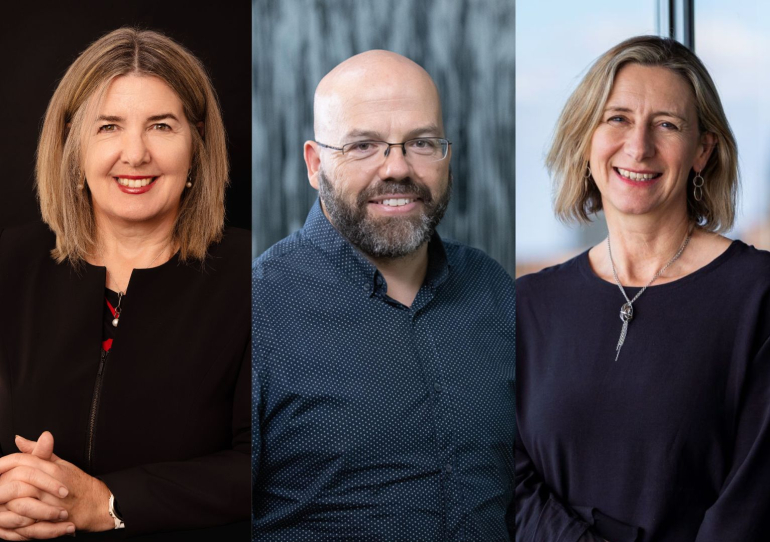Scientia Professor Rebecca Ivers, Professor Stuart Tangye and Professor Gail Matthews from UNSW Medicine & Health are among 27 of the nation’s top medical and health researchers elected as Fellows of the Australian Academy of Health and Medical Sciences (AAHMS).
The announcement was made at a ceremony at the Queensland University of Technology in Brisbane on 12 October.
UNSW Professor Adrienne Torda, Acting Dean of Medicine & Health, congratulated the three UNSW academics.
“I’m so proud of Professors Rebecca Ivers, Stuart Tangye and Gail Matthews, who have been recognised by their peers for their research on the burden of injury, immunology and therapeutic interventions for HIV, viral hepatitis and COVID-19. Their dedication and expertise play a crucial role in healthcare and improving the overall quality of life within our community,” Prof. Torda said.
AAHMS Fellows represent Australia’s leading minds in health and medical sciences, recognised for their clinical, non-clinical, leadership, industry and research contributions.
Scientia Professor Rebecca Ivers (AM)
Prof. Ivers, Head of the School of Population Health at UNSW, has been recognised for her expertise in injury research, trauma care and falls prevention.
“Injury generates a significant burden of disability and death globally, and there remains a huge equity gap with people from marginalised populations and low-income settings locally and globally most impacted,” Prof. Ivers said.
“Despite this, it remains an area where there is poor investment in both research and policy. I hope that my election to the Academy helps draw attention to this field, highlighting the need for locally designed, co-designed solutions from those most impacted.”
Prof. Ivers’ research has focused on reducing inequities in road injuries, drowning, burns and falls, working in partnership with Aboriginal and Torres Strait Islander people, and with clinicians in resource poor settings. She has worked closely with the World Health Organization (WHO) and recently co-authored a major technical package on fall prevention for the WHO, Step Safely.
“I have been privileged to work with a range of community and policy partners to understand their priorities and co-design and implement solutions to reduce injury and ensure culturally safe care,” Prof. Ivers said.
Professor Gail Matthews, Kirby Institute, UNSW Sydney
Prof. Matthews from the Kirby Institute at UNSW Sydney has been recognised for her work on therapeutic interventions for HIV, viral hepatitis and COVID-19.
“I am proud to have been elected as a Fellow of the AAHMS. The academy is an important voice ensuring the most important health and medical science issues for Australians are addressed, and in joining this prestigious group, I look forward to continuing to progress research on equitable access to life-saving treatments, especially for marginalised and at-risk groups,” said Prof. Matthews.
Prof. Matthews is a clinical academic in infectious diseases whose research includes acute hepatitis C infection, HIV and viral hepatitis including hepatitis B, acute COVID-19 treatments and long-term sequelae of COVID-19, as well as infections in people who inject drugs.
She is Head of the Kirby Institute’s Therapeutic and Vaccine Research Program and leads a number of significant global collaborations, including the recently completed international D2EFT trial on second-line HIV treatment, the results of which she announced earlier this year. She has recently been appointed Chair of STRIVE, a major global ‘network of networks’ specialising in clinical trials currently focussed on pandemic preparedness.
Prof. Matthews is also leading the ADAPT cohort study, which is tracking the progress of long COVID patients at St Vincent’s Hospital, Sydney, and was seminal in identifying an immunological signature for long COVID.
Professor Stuart Tangye, Garvan Institute of Medical Research, UNSW Sydney
Prof. Tangye from the Garvan Institute of Medical Research and Conjoint Professor at UNSW’s School of Clinical Medicine has been recognised for his leading contributions to the field of immunology and the genetic diagnoses of inborn errors of immunity.
Prof. Tangye’s research focus is human immunology and how immune deficiencies due to a genetic cause, otherwise known as inborn errors of immunity, can lead to disease, on which he has published more than 250 peer-reviewed research articles and invited reviews.
His input has been fundamental to identifying genetic variants in patients with rare immune conditions and has led to the discovery of 22 new inborn errors of immunity, reported in prestigious scientific journals.
Among his outstanding achievements is the establishment of the Clinical Immunogenomics Research Consortium Australasia (CIRCA) in 2015. This multi-disciplinary, collaborative network aims to expedite genomic diagnosis and treatments for individuals with inborn errors of immunity and enable new research projects to reveal how these genetic variants cause disease in individuals with these conditions.
“I’m delighted that my team’s work has received this recognition. Patients with inborn errors of immunity often get left behind. Through work that was initiated in my lab many years ago, and is now embedded in the CIRCA network, we have been able to help genetically diagnose immune diseases, guide treatment and change the lives of patients affected by these conditions. I am grateful to the Academy for acknowledging this important work,” Prof. Tangye said.
Read the full list of Fellows.
